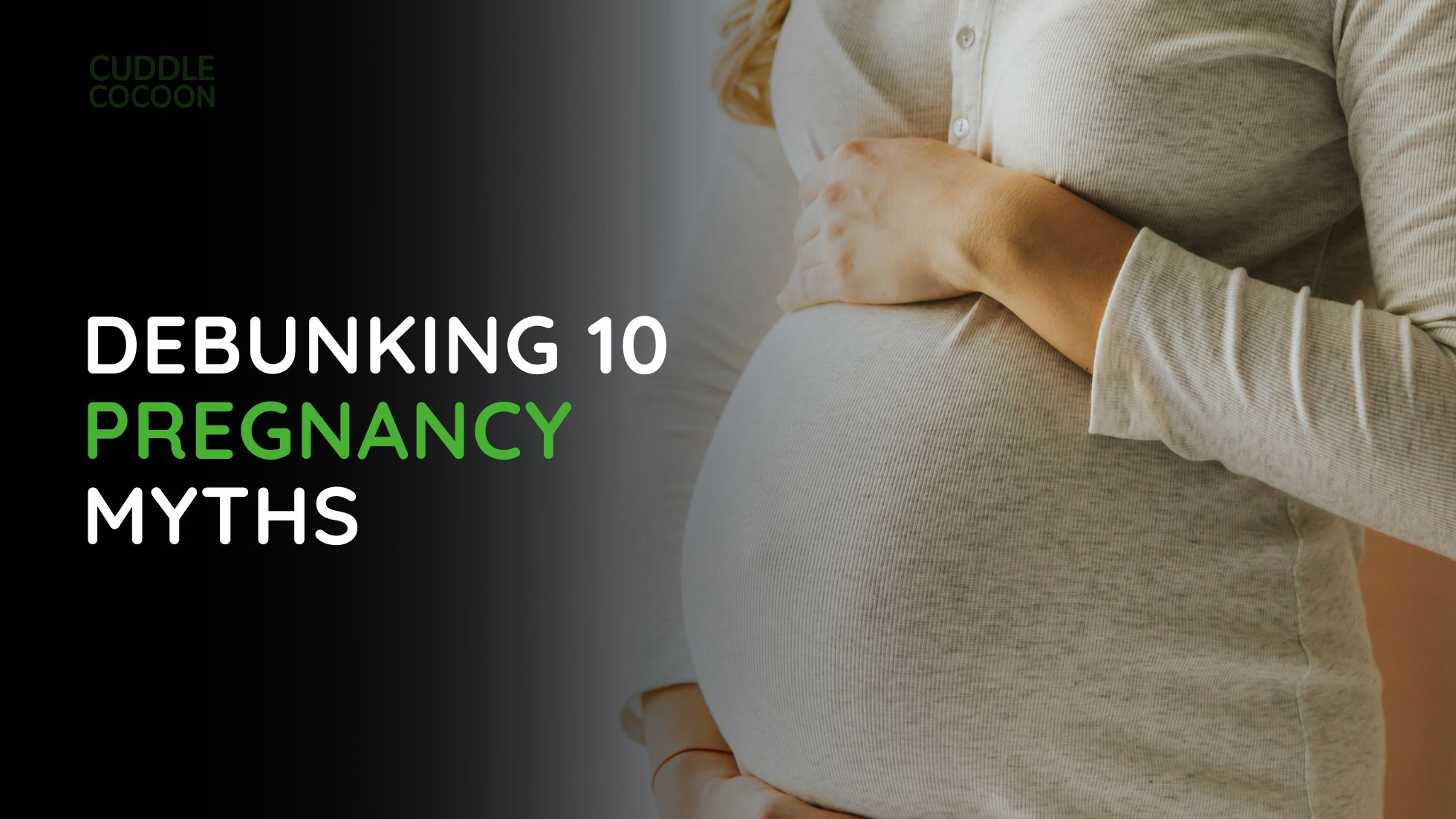Pregnancy is one of the most exciting yet overwhelming experiences for any expecting mom. From the moment you find out you’re pregnant, everyone seems to have an opinion, a piece of advice, or an old wives’ tale to share. However, not all of the advice out there is accurate — many myths about pregnancy have been passed down through generations but aren’t grounded in science.
At Cuddle Cocoon, we believe in giving expecting mothers the best, most accurate information to help them navigate this incredible journey. Let’s dive into some of the most common pregnancy myths and debunk them with facts!
1. You’re Eating for Two
Myth:
One of the most common myths is that you need to eat double the amount of food because you’re “eating for two.”
The Truth:
While it’s true that your baby needs nutrients, you do not need to double your food intake. In fact, overeating can lead to unnecessary weight gain and health complications. During pregnancy, the average woman only needs an extra 300–500 calories per day, depending on her trimester and activity level. Eating nutrient-dense foods is more important than eating larger quantities.
2. Carrying High Means a Girl, Carrying Low Means a Boy
Myth:
A popular myth suggests that the way you carry your baby can determine its sex. If you’re carrying high, it’s a girl; if you’re carrying low, it’s a boy.
The Truth:
The way you carry your baby depends on your body type, the baby’s position, and muscle tone. There’s no scientific evidence linking the height of your belly to your baby’s gender. In fact, an ultrasound is the only accurate way to determine the sex of your baby.
3. Heartburn Means Your Baby Will Have Lots of Hair
Myth:
Another old wives’ tale is that experiencing heartburn during pregnancy means your baby will be born with a full head of hair.
The Truth:
While some studies suggest that there may be a slight correlation between heartburn and hair growth, there’s no definitive evidence linking the two. Heartburn in pregnancy is more likely caused by hormonal changes and the growing uterus pressing against your stomach, which can lead to acid reflux. Your baby’s hair, however, is mostly determined by genetics.
4. You Can’t Dye Your Hair While Pregnant
Myth:
Many believe that dying your hair during pregnancy is harmful to the baby due to the chemicals in hair dye.
The Truth:
While it’s a good idea to avoid chemicals when possible during pregnancy, the risk associated with dyeing hair is minimal. The chemicals in hair dye are not significantly absorbed into the skin, and studies have shown that hair dye is generally safe during pregnancy. If you’re concerned, you can opt for natural, ammonia-free hair dye or wait until the second trimester when your baby’s development is more advanced.
5. Pregnant Women Can’t Exercise
Myth:
A common myth is that you should avoid all exercise while pregnant to protect the baby.
The Truth:
In most cases, exercise is safe and even beneficial during pregnancy, unless advised otherwise by your doctor. Regular physical activity can help improve circulation, reduce back pain, and prevent excessive weight gain. Activities like walking, swimming, and prenatal yoga can be great ways to stay active. Always consult your doctor before starting any exercise routine to ensure it’s safe for you and your baby.
6. Pregnancy Cravings Are Always for Unhealthy Foods
Myth:
Pregnant women crave junk food, pickles, and ice cream, right?
The Truth:
While pregnancy cravings are real, they’re not necessarily a sign that you need to indulge in unhealthy foods. Cravings often stem from hormonal changes and can be for a variety of reasons, including nutrient deficiencies. For example, a craving for salty snacks could indicate a need for more sodium, while a craving for dairy might signal a calcium need. That said, it’s important to balance cravings with healthy, nutrient-rich foods.
7. You Can’t Travel During Pregnancy
Myth:
Many people believe that traveling during pregnancy is dangerous for both mom and baby.
The Truth:
Traveling is generally safe during pregnancy as long as there are no complications, and you are in good health. If you’re traveling by car or plane, make sure to take frequent breaks to stretch and stay hydrated. The second trimester (weeks 14 to 27) is often considered the best time to travel, as the risk of miscarriage decreases and you may feel more energized. Always consult your doctor before traveling, especially if you have any high-risk pregnancy conditions.
8. Pregnancy Glows Mean You’re Always Healthy
Myth:
The “pregnancy glow” is often seen as a sign that you’re healthy and glowing on the inside.
The Truth:
While many women experience changes in their skin, the pregnancy glow isn’t a universal experience. Some women might struggle with acne, dryness, or pigmentation changes due to pregnancy hormones. Healthy glowing skin has more to do with the individual’s health, genetics, and hydration than with pregnancy alone. It’s important to focus on staying hydrated, eating well, and practicing good skincare habits during pregnancy.
9. You Can’t Have Sex While Pregnant
Myth:
This myth suggests that sex is dangerous during pregnancy and could harm the baby.
The Truth:
Sex is generally safe during pregnancy, as long as you have no complications or contraindications, such as bleeding or a high-risk pregnancy. The baby is well-protected in the uterus by the amniotic sac and the cervix, so there’s little risk of harm from sexual activity. Always consult your doctor if you have any concerns or complications that may affect your sexual activity.
10. Pregnancy Is the Best Time to Quit Smoking or Drinking Without Any Risks
Myth:
Some people believe it’s safe to quit smoking or drinking during pregnancy and that the baby won’t be affected if you stop after conception.
The Truth:
Smoking and drinking alcohol are never safe during pregnancy. Both can have serious consequences for the baby’s development. Nicotine and alcohol can interfere with fetal development, causing long-term issues such as low birth weight, preterm birth, and developmental delays. The earlier you quit, the better, but it’s never too late to improve your pregnancy outcome by avoiding these harmful substances.
Final Thoughts: Trust Your Body, Trust the Facts
Pregnancy is a time of change, and it’s normal to feel overwhelmed by the sea of advice, myths, and old wives’ tales out there. However, it’s important to rely on science-backed information and consult with your healthcare provider when making decisions.
At Cuddle Cocoon, we believe in providing you with accurate, gentle care — from pregnancy through the baby’s first year. Understanding the facts behind pregnancy myths can help you feel more confident and informed as you navigate this beautiful, life-changing journey.
Want more pregnancy tips? Check out our blog on pregnancy self-care →

